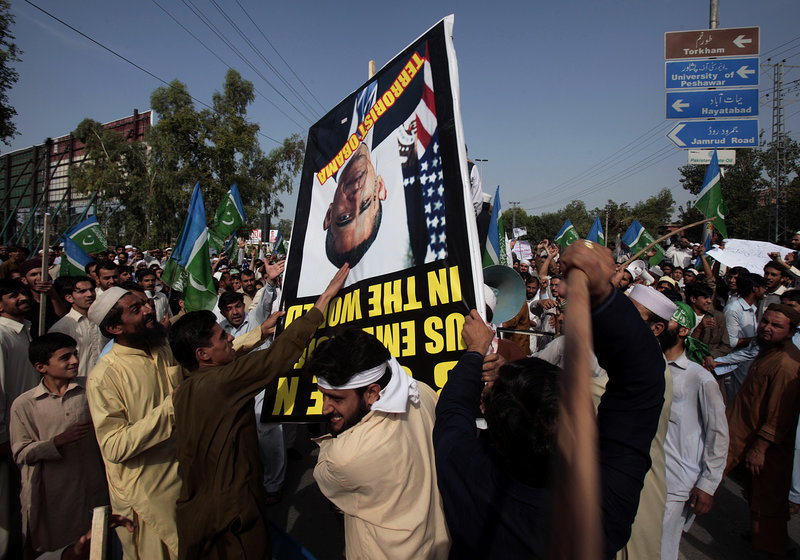KABUL, Afghanistan
Suicide bomb was revenge for film, militants claim
Islamic militants sought Tuesday to capitalize on anger over an anti-Islam video that was produced in the United States, saying a suicide bombing that killed 12 people in Afghanistan was revenge for the film and calling for attacks on U.S. diplomats and facilities in North Africa.
The attempt by extremists across the region to harness Muslim fury over a film that denigrates the Prophet Muhammad posed new concern for the United States, whose embassies and consulates have been targeted, and in some cases breached, during riots and protests over the past week.
At the same time, Western leaders welcomed statements by Middle East governments that condemned the violence against diplomatic facilities on their soil, even as they expressed anger over the video. Some of those governments replaced autocratic regimes in popular uprisings that swept the region, allowing for greater leniency toward protest.
At least 28 people have died in violence linked to the film in seven countries, including U.S. Ambassador Christopher Stevens and three other Americans killed in a Sept. 11 attack on the U.S. Consulate in Benghazi, Libya. The toll also includes 12 protesters killed in riots over the film last week.
Some officials in Libya have said the attack on the consulate was planned in advance by militants. However, the White House said Tuesday the assault appeared to have been sparked by anger over the film, though the investigation continues.
ANCHORAGE, Alaska
Dividend from oil wealth $878 – but it won’t go far
This is the day Alaskans crow about to their brethren in the Lower 48, trying to make them jealous that the government gives them money to just live here.
Alaskans got the word Tuesday that this year’s Permanent Fund Dividend will be $878. Almost all Alaskans – nearly 647,000 people – will receive a dividend, their yearly share of the state’s oil wealth.
But what your Alaskan friends may not tell you is that the yearly bounty barely makes a dent in the higher cost to live in the nation’s northernmost state – and this year’s checks won’t go far.
Living in Alaska costs more since most everything has to be shipped in. In fact, 90 percent of all goods sold in the state pass through the Port of Anchorage.
There’s no such thing as a dollar menu at a fast-food restaurant in Alaska – it’s more like a $1.50 or $2 menu. And there’s a reason why many TV commercials advertising prices have a line in small print at the bottom saying prices may be higher in Alaska and Hawaii: It’s because they are.
PHOENIX
Ruling lets police start enforcing immigration law
A judge in Arizona ruled Tuesday that police can immediately start enforcing the most contentious section of the state’s immigration law, marking the first time officers can carry out the so-called “show me your papers” provision.
The decision by U.S. District Judge Susan Bolton is the latest in a two-year legal battle over the requirement. It culminated in a U.S. Supreme Court decision in June that upheld the provision on the grounds that it doesn’t conflict with federal law.
Opponents responded to the Supreme Court decision by asking Bolton to block the requirement on different grounds, arguing that it would lead to systematic racial profiling and unreasonably long detentions of Latinos if it’s enforced. She said early this month she wouldn’t block it, and gave the go-ahead Tuesday for the law to take effect.
The section of the law requires that officers, while enforcing other laws, question the immigration status of those suspected of being in the country illegally. The “show me your papers” name comes from opponents.
Arizona’s law was passed in 2010 amid voter frustration with the state’s role as the busiest illegal entry point into the country. Five states – Alabama, Georgia, Indiana, South Carolina and Utah — have adopted variations on Arizona’s law.
HARRISBURG, Pa.
Court told to block ID law if it threatens voters’ rights
Pennsylvania’s highest court on Tuesday told a lower court that it should stop a tough new voter photo identification law from taking effect in this year’s presidential election if the judge concludes voters cannot easily get ID cards or thinks they will be disenfranchised.
The 4-2 decision by the state Supreme Court sends the case back to the lower Commonwealth Court, where a judge initially ruled in August that the divisive law could go forward. The high court asked for an opinion by Oct. 2 – just 35 days before the election.
If the judge finds there will be no voter disenfranchisement and that IDs are easily obtained, then the 6-month-old law can stand, the Supreme Court said.
A spokesman for the Pennsylvania Department of State, which oversees voting and elections, said the agency will provide whatever information a judge may seek.
“We believe, as we have all along, that any legal voter who wants to get an ID is able to do so,” spokesman Ron Ruman said.
Send questions/comments to the editors.



Success. Please wait for the page to reload. If the page does not reload within 5 seconds, please refresh the page.
Enter your email and password to access comments.
Hi, to comment on stories you must . This profile is in addition to your subscription and website login.
Already have a commenting profile? .
Invalid username/password.
Please check your email to confirm and complete your registration.
Only subscribers are eligible to post comments. Please subscribe or login first for digital access. Here’s why.
Use the form below to reset your password. When you've submitted your account email, we will send an email with a reset code.